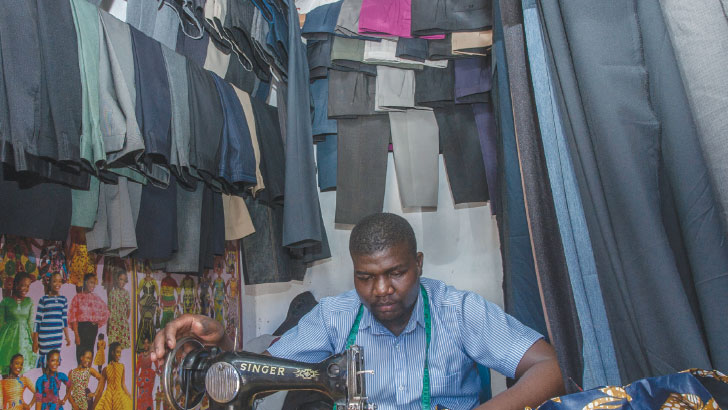Mustafa thrives in tailoring
Tactically positioned in Chilinde Township in Lilongwe City, Executive Tailoring Shop boasts of being the home of excellent wear made by Mustafa Saride.
Setting eyes on his products for the first time would make one think they are imported.
As any child prepared for greatness and future responsibility by his parents, Mustafa was introduced to school at a tender age, but dropped out while in Standard Eight due to poverty.
The young man says failure to continue with his studies was not a justifiable reason for him to dwell in a life of poverty.

“My situation was more of an opportunity than a limitation because it made me stronger,” says Mustafa.
Things began to look good for him when he started staying with his uncle, Kenneth Mponda, in 2005 when he was 14. The uncle started training him in tailoring and designing.
Recalls Mustafa: “My uncle, who learnt the trade in Tanzania and Zambia, equipped me with special practical skills in the job until tailoring and designing got into my blood.”
Realising that to have uncommon results one needs to use unique methods at all times, he mastered the skill of making men’s clothes which most Malawian seamstresses find difficult to do.
“I identified a weak point in most tailors and designers and turned it into a unique strength to be different. To be different, you need to do what others don’t do, so I produce the best men’s clothes,” says Mustafa.
The production of men’s fabrics attracts more female customers to his business.
Looking at how Mustafa uses his sewing machine to pass thread repeatedly through pieces of fabric to join them together, one notices that tailoring flows in his veins.
Sewing clothes that Malawians mostly import such as jean trousers and executive suits using unique textile materials and threads adds more colour to his uniqueness.
“I am so familiar with the sewing machine that I give it specifications for uncommon performance,” says Mustafa, adding that: “Through that, I am able to produce special wear like jeans, corduroy, executive suits and safari suits.”
Fashion mannequins are usually stationed outside his shop revealing the best and smart looks the customers can have after having their clothes made by him.
Mustafa uses his smartphone as a productive tool for downloading new designs from WhatsApp groups he joined to improve his skills and keep track of fashion.
It is said that a poor workman blames his tools, but the seamstress has no excuse for poor performance because of equipment inefficiency as he uses well-conditioned sewing machines and high-quality steam iron to straighten and smarten customers’ clothes.
One of Mustafa’s regular customers, Eck Ndalama says he likes shopping from him because his commodities are of international standards and affordable.
“I buy from Mustafa because he does the same stuff we sometimes buy from other countries and he sells them at reasonable prices,” he says, adding that: “The materials he uses for clothes are uncommon and nice.”
Beyond doubt, there is a need to improve the tailoring profession in Malawi for it to match international standards.
Lilongwe Technical College principal Suzgika Mvalo says there are numerous reasons to incorporate tailoring and design in the college’s programmes.
Among other things, he says the programme would reduce the unemployment rate and minimise the risk of contracting skin diseases from second-hand clothes if national colleges produce skilled labour in the field.
Apart from bringing forex, serious investment in tailoring and fashion design would also make Malawi’s dream of becoming a predominantly exporting nation a reality.
Since 2009, the country has been promoting the ‘Buy Malawi’ initiative which is intended to encourage Malawians to consume locally produced goods and services.





